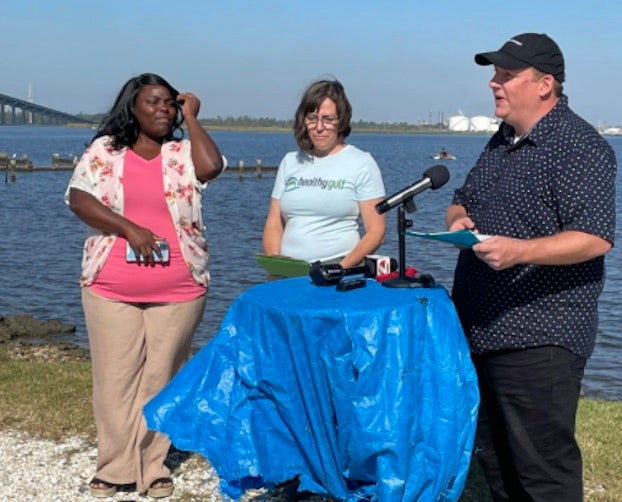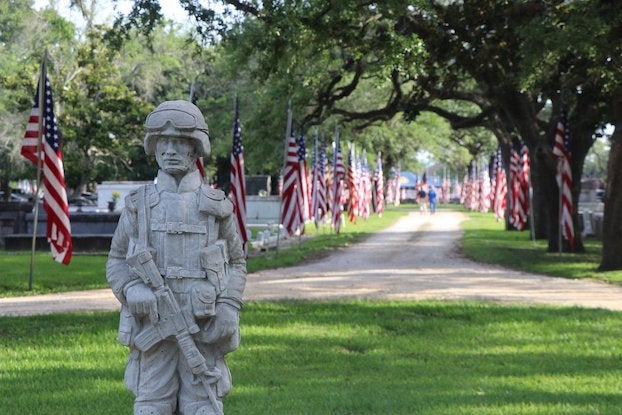Community activists warn of LNG plants, climate change
Published 5:55 pm Tuesday, November 2, 2021

- Louisiana Bucket Bridge, Healthy Gulf, Sierra Club, Vessel Project and Green Army call Tuesday for a transition into renewable energy sources. They said Southwest Louisiana, an area that has seen multiple natural disasters over the past 14 months, doesn’t need more LNG plants. (John Guidroz / American Press)
Several organizations and activists held a news conference in Lake Charles Tuesday and demanded a transition to more renewable energy sources, rather than building more liquefied natural gas plants in hurricane-prone areas like Southwest Louisiana.
The conference was organized by the Louisiana Bucket Bridge, Healthy Gulf, Sierra Club, Vessel Project and Green Army. It was held at Israel LaFleur Park in response to the 18th World LNG and Gas Series: Americas Summit and Exhibition that kicked off Tuesday at Golden Nugget Casino and continues through Thursday.
James Hiatt, Louisiana Bucket Brigade Southwest Louisiana coordinator, mentioned the various natural disasters that have occurred over the last 14 months, including Hurricanes Laura and Delta, the winter storm in February, the historic May flooding and the tornadoes that touched down just south of Lake Charles last week. He said a “climate crisis” exists and should be addressed.
“What we don’t need is more plants putting out greenhouse gases that will continue to exacerbate the problem,” he said. “What we want is action and for people to listen and become aware of what’s going on in this area.”
Hiatt spoke of the various LNG plants that are either operating or are planned in Southwest Louisiana, including Lake Charles LNG, Driftwood LNG, Commonwealth LNG, G2 LNG and others. He mentioned how the tax exemptions industries receive to locate here could be used to improve drainage, schools and roadways.
“How many plants do we need to export LNG out of this place,” he asked. “What is the benefit for us? Industries are coming anyway (because) we have this infrastructure. Why are we giving them tax breaks? We’re placing profits over people.”
Naomi Yoder, staff scientist with Healthy Gulf, said LNG is a fossil fuel, and calling it clean fuel is nothing more than a smoke screen. Yoder said building additional LNG plants will only weaken the existing wetlands that act as a natural barrier from hurricanes.
“Why are we building all of these things when we don’t have viable choices to rebuild our communities,” Yoder asked.
Yoder said industry leaders who are attending the LNG summit in Lake Charles should be at this year’s United Nations Climate Change Conference in Glasgow, Scotland.
“It is time for real innovation,” Yoder said. “When will we see long-term, stable jobs offered to people that don’t prop up a boom-and-bust industry?
Roishetta Ozane, Southwest Louisiana and Southeast Texas community organization for Healthy Gulf, said the ongoing post-hurricane needs in Southwest Louisiana are so great that residents can’t focus on the impact industrial facilities are having.
“What you see is blue tarps lining our skylines,” she said. “So many people are without housing and have housing insecurity. With these facilities here and this big summit, what are you actually doing for the community?”
Michael Tritico, president of Restore Explicit Symmetry to Our Ravaged Earth, or RESTORE, said the U.S. Coast Guard released information saying that if one LNG tanker loses its cargo and ignites, the burn zone radius would be three miles. He said the Graywood community is within three miles from Lake Charles LNG, with Deatonville on the other side of the plant.
“A transition to renewable energy is the only sensible thing to do,” Tritico said. “We must get away from fossil fuels and go to wind and solar.”
Hiatt also read a statement from retired Army Lt. Gen. Russel Honore, who said that natural gas “may be essential today, but we don’t need to be investing in unsustainable solutions.”





